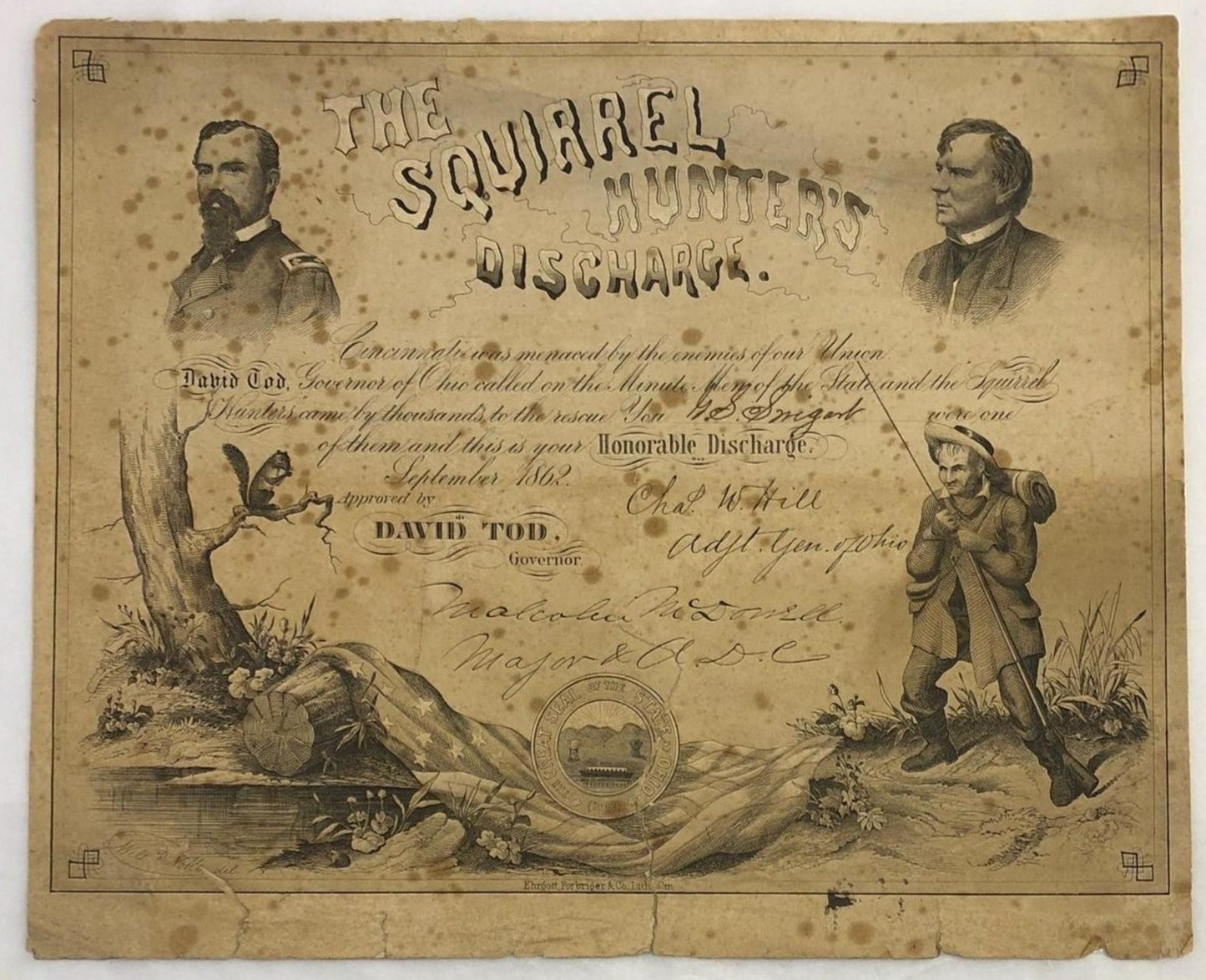Blanchester Area Historical Society
1862. "Squirrel Hunters" discharge papers.
1862. "Squirrel Hunters" discharge papers.
1862. Discharge papers for the famous "Squirrel Hunter's" of Blanchester and Clinton County. Their show of force in Kentucky during the Civil War helped turn the rebellion away from Cincinnati.
The Squirrel Hunters
During the week ending September 11, 1862, there was great excitement at Wilmington and throughout the county. Rumors arrived on Wednesday evening, the 3d of the month, by telegraph, that Cincinnati was in imminent danger of attack from a large force of rebels who were marching upon it from the Kentucky side of the Ohio.
The alarm spread rapidly. A meeting was called to be held at the court house, and soon the bell rang out in impatient tones to call the people together. Posters were printed and widely circulated, calling on the citizens of the county to assemble at Wilmington the following day, bringing with them all available kinds of fire-arms, for the purpose of organizing volunteer companies to go to the defense of Cincinnati.
“Runners” were sent into the country to tell the news, calls to arms were issued by the newspapers, and, on the morning of the next day, an immense gathering of people assembled at the county seat, the men being armed with squirrel rides, shot-guns, muskets, etc., and the boys of fourteen were as eager to be enrolled as were their elders, of all ages up to threescore and ten.
It needed but this danger to thoroughly arouse the people, and the uprising in the county was greater than at any other time during the war. Volunteers were called for at the meeting held in the forenoon at the court house, and 405 men stepped forward immediately. A special train was provided by the railroad company, and at 6 o’clock in the evening the men embarked, having been formed into companies about an hour before.
These companies were officered as follow's:
First Company — John Q. Smith, Captain; Leroy Pope, First Lieutenant; John A. Smith, Second Lieutenant.
Second Company — David Brown, Captain; Elon B. Ward, First Lieutenant; John W. Custis, Second Lieutenant.
Third Company — Mahlon Wall, Captain; William C. Wilson, First Lieutenant; Samuel Rulon, Second Lieutenant.
Fourth Company — A. E. Steele, Captain; Christopher Rhonemus, First Lieutenant; M. P. Early, Second Lieutenant.
These companies were all formed at Wilmington; a fifth, raised at Blanchester, had for its officers John K. Trickey, Captain; Joseph Kelsey, First Lieutenant.
All proceeded to Cincinnati, and were formed into a battalion. They were sent to a position some miles south of the city, in Kentucky; but, after a few days, were sent home, the rebels, under Kirby Smith, failing to give them a chance to test their mettle and marksmanship.
These volunteers became known as the “ squirrel hunters,” a name which has been recorded in history. Although they saw no fighting, heard not the roar of heavy guns nor the rattle of musketry, and had no chance to spill blood, yet they felt ready for anything, and had they been well armed, must have made ugly opponents for even a well organized army.
Source: The History Of Clinton County. W. H. BEERS & CO. 1882. Page 446.

If you found this information useful please consider making a tax deductible donation.
